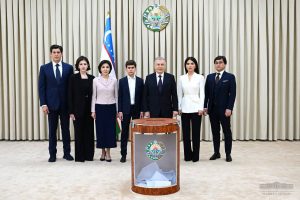Technically well-prepared, but lacking open debate and genuine political pluralism, with a side of “administrative resources” misuse — that is the gist of the preliminary findings from the OSCE’s mission to observe Uzbekistan’s April 30 constitutional referendum.
According to Uzbekistan’s Central Election Commission (CEC), 90.21 percent of those who voted in Sunday’s referendum approved the new constitution. Turnout, the CEC said, exceeded 84 percent.
In December 2021, Uzbek President Shavkat Mirziyoyev outlined his proposal for a revamped constitution, packaging it as a necessary next step in the reform program that has defined his administration. But when the first draft of the proposed constitutional changes was made public in June 2022, it set off protests in Karakalpakstan. For reasons never quite explained, the first draft of the proposed constitutional changes included the scrapping of Karakalpakstan’s sovereignty, in particular its constitutional right to secede from Uzbekistan. The ensuing protests were large but quickly quashed, the specter of the Karimov era raising its head amid Mirziyoyev’s push for a “New Uzbekistan.” Mirziyoyev flew to Nukus, the capital of Karakalpakstan and promised to remove the offending provisions.
In August 2022, the Uzbek authorities closed public comment on the constitutional draft, but the momentum for the referendum had been clearly interrupted. For several months, little to nothing was said about it.
In early 2023, the first of two major trials of those Tashkent blamed for the unrest in Karakalpakstan ended. Lawyer and journalist Dauletmurat Tazhimuratov was sentenced to 16 years, a harsh sentence for a man who called for a “no” vote should a constitutional referendum be held.
A month later, in early March 2023, a final draft of the referendum was unveiled and the vote scheduled for April 30. The final draft altered 65 percent of the existing Uzbek Constitution, including the introduction of 27 new articles and 159 new provisions. Although some aspects of the new constitution represent a progressive upgrade — such as protections for people from wanton home demolition, provisions barring discrimination against women in the workplace due to pregnancy, and enshrining the right to remain silent for those accused of crimes — the tinkering with the presidential term (expanding it from five to seven years) harkens back to an old Karimov trick to dodge the pesky two-term limit for the presidency, which remains in the constitution.
The OSCE referendum monitoring mission noted in their preliminary findings that while there was a government-run “Yes” campaign — for which the government reportedly marshaled public servants and celebrities — “there was no organized opposition to the amendments.” The fate of Tazhimuratov is illustrative in explaining why, and how, there was no organized opposition. As the OSCE noted, the vote occurred in “an environment short of genuine political pluralism and competition.”
As Bruce Pannier wrote last month for BNE Intellinews, “The problem with the constitution has always been whether the authorities choose to pay any attention to it.” Once again, there is an opportunity for the Uzbek authorities to abide by their own constitution, but little precedent for Tashkent to do so when it runs counter to the priorities of the powers-that-be. And with the new constitution enshrined in law, that power will remain Mirziyoyev for years to come.
































